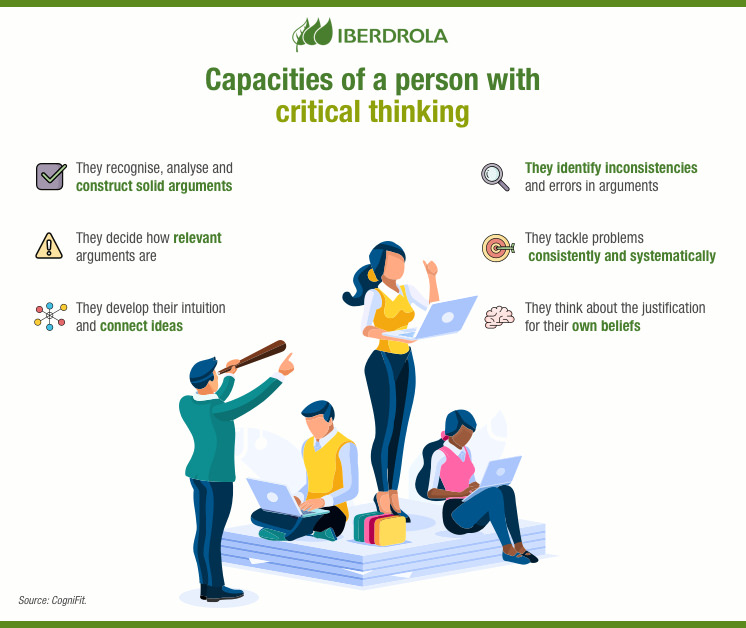Critical thinking
The value of critical thinking in society today
Fake news, which emerged with the new technologies and social networks — which increase its impact —, is unfortunately all the rage. The best way to combat fallacies is to develop critical thinking in order to analyse what you read, hear or see before accepting it as true.

Critical thinking is definitely not a new idea; in fact, it was originated in ancient Greece with Socrates and the Socratic method, Plato and dialectics, Aristotle and rhetoric. But, instead of these thinkers, it was the philosopher Max Black who is credited with coining the term, which he used as the title of a book on logic in 1946. Neither these Greek teachers nor Black knew anything about what we now know of as fake news, but they did know about human being ability to reason.
What critical thinking is and why it is important today
There are as many definitions of the term as there are experts who have discussed the topic, but maybe the simplest and most concise came from Francis Bacon — not to be confused with the painter — in 1605. "Critical thinking is a desire to seek, patience to doubt, fondness to meditate, slowness to assert, readiness to consider, carefulness to dispose and set in order; and hatred for every kind of imposture". From a more modern viewpoint, critical thinking is understood to be the ability to analyse and evaluate the consistency of arguments, in particular statements that society accepts as being true in the context of everyday life, like fake news, which is especially important today because of its proliferation and rapid viralization.
Francis Bacon (1561-1626)
Critical thinking is a desire to seek, patience to doubt, fondness to meditate, slowness to assert, readiness to consider, carefulness to dispose and set in order; and hatred for every kind of imposture
In fact, fake news has a great deal to do with what is known as the bandwagon effect and this in turn is linked to the critical analysis of reality, or rather, the absence of reality. The term refers to a psychological theory according to which individuals adopt behaviours and ideas simply because the vast majority of people do, without questioning them or analysing them beforehand. The best antidote to this trend is fostering and developing critical thinking.
How is critical thinking useful? Benefits
Being critical helps us to see the difference between mediocre and brilliant ideas, to distinguish between valuable and unnecessary information, to challenge prejudices, to draw well founded conclusions, to come up with alternatives, to improve communication and, lastly, to be the masters of our own thoughts and to act accordingly. Although it is a cognitive activity closely related with reasoning, the aim of critical thinking is action oriented and is applicable to any part of everyday life, including problem-solving and decision-making, so that its area of influence ranges from the personal to the work-related.
Can critical thinking be learned? Some experts consider that it can, especially if training in it starts at school. As an adult, it is more complicated, but there are activities that can help: analysing information in small chunks — the importance of details and looking for patterns —, practising being curious and sceptical — asking yourself questions and comparing the information with other sources — and questioning everything you are told — especially if it fits in with your own beliefs —.

SEE INFOGRAPHIC: Capacities of a person with critical thinking [PDF] External link, opens in new window.
Seven key factors of critical thinking
Dr. Richard Paul and Dr. Linda Elder, researchers with The Critical Thinking Organization, have established seven universal intellectual standards that must be applied to think each time you want to evaluate the quality of an argument. They are listed below, and each one is linked to its predecessor:
 Clarity
Clarity
If an argument is not clear, the person who receives it cannot evaluate whether the idea is correct or important, or offer counter-arguments. In this case, it is advisable to ask questions, such as "could you give me an example?", which will help to understand and even visualise the idea.
 Accuracy
Accuracy
A proposition may be clear but not accurate. Vagueness and ambiguity are the enemies of a solid message. Asking questions like "where did you get that from?" ensures that the proposition, if it comes from a reliable source, will be true.
 Precision
Precision
A claim like "that girl is quite tall" may be correct and true, but it lacks precision. Faced with a statement like this, it is necessary to ask for more details: "Could you be more specific?" Or "How tall is she exactly?".
 Relevance
Relevance
A proposition may be clear, true and precise, but not relevant. This means that it may or may not have a direct link to the topic under discussion, for example. To ensure it is relevant, we can ask the speaker how it relates to the topic in hand.
 Depth
Depth
A proposition may be clear, true, accurate and relevant, but it may lack depth. For example, the phrase "Say no to drugs", when used to discourage people from using them, tackles a very complex problem in a superficial way. "Could you offer some supporting arguments?" is the question to ask in this case.
 Breadth
Breadth
A proposition may be clear, true, accurate, relevant and deep, but it may not be sufficiently broad, taking into account other points of view. Questions like "is there another way of looking at this problem?" help you to get a better perspective.
 Logic
Logic
A proposition may be clear, true, accurate, relevant, deep and broad, but not logical. When we argue, we line up different thoughts. If these arguments support each other, the thinking is logical. If, however, they don't back each other up or are contradictory, then the combination is not logical.




